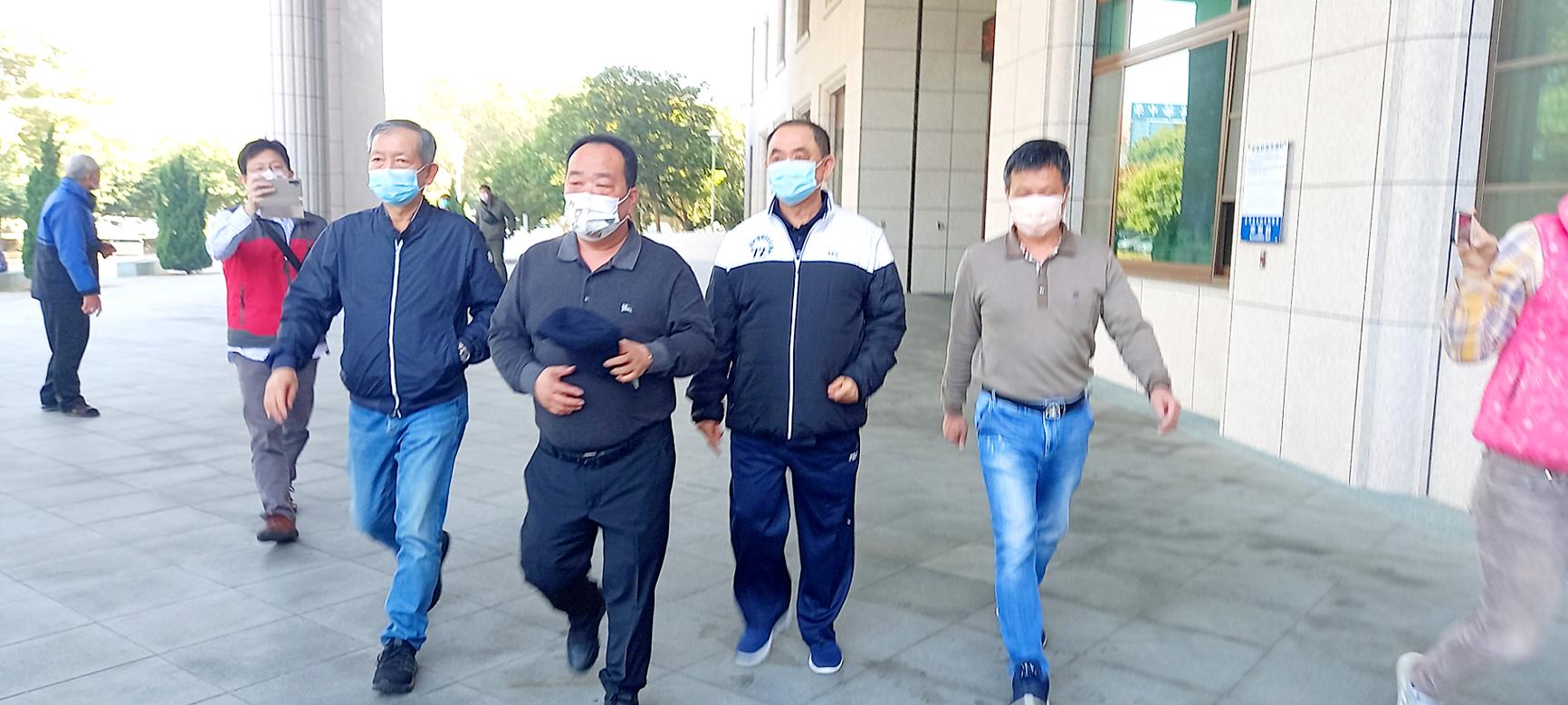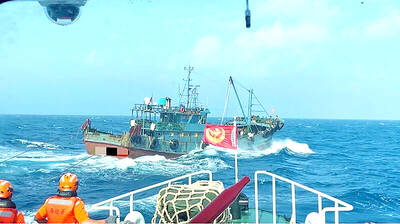Bookie Chen Ying-chu (陳盈助) was released on bail yesterday after authorities earlier this week conducted searches and shut down illegal betting sites.
Chen posted bail of NT$150 million (US$5.28 million) with restrictions placed on his movement.
About 60 people were questioned on Tuesday amid a probe into alleged illegal online betting and other offenses linked to gambling platforms.

Photo: Ting Wei-chieh, Taipei Times
Chiayi County Chief Prosecutor Tsai Ying-chu (蔡英俊) said that his office coordinated with Kaohsiung prosecutors, and more than 600 police officers and judicial investigators to conduct searches at the offices of Chen’s Ying Sheng International Co (營勝國際) and other locations mainly in Chiayi City, Taichung, Kaohsiung and Taipei.
Chen and other suspects face charges of illegal gambling linked to the betting sites and possibly money laundering, Tsai said.
Authorities seized computers, mobile phones, bank account records, ledgers and other documents, as well as about NT$70 million in cash, Tsai said.
Kaohsiung prosecutors said that searches were carried out at an office building in the city on Tuesday evening that is believed to be the headquarters from which the gambling sites were run.
Networking systems, and 10 computers with betting and gaming software were seized, while more than 30 people — allegedly programmers and computer engineers working for Chen — were detained, Kaohsiung prosecutors said.
Ying Sheng has run several gambling sites for many years, offering sports betting, lotteries and other games.
Investigators have found that Chen has established legitimate casino and other gambling operations in Macau and the Philippines, Tsai said.
However, his overseas businesses have been affected amid the COVID-19 pandemic and face closure, Tsai said, adding that most of his Taiwanese staff have returned.
Young people who worked at his overseas operations helped to expand the online betting business in Taiwan after their return, Tsai said.
They set up new sites to attract Taiwanese, which prompted authorities to last year begin surveillance of them, he said.
Chen was indicted in 1999 over an alleged illegal sports betting operation involving Taiwanese baseball and in 2006 was embroiled in a NT$8.6 billion international money laundering case, but was acquitted in both cases due to insufficient evidence.
In the past few years, Chen launched a charity organization for community welfare work.

MILITARY BOOST: The procurement was planned after Washington recommended that Taiwan increase its stock of air defense missiles, a defense official said yesterday Taiwan is planning to order an additional four PAC-3 MSE systems and up to 500 missiles in response to an increasing number of missile sites on China’s east coast, a defense official said yesterday. The official, who spoke on condition of anonymity, said that the proposed order would be placed using the defense procurement special budget, adding that about NT$1 trillion (US$32,88 billion) has been allocated for the budget. The proposed acquisition would include launchers, missiles, and a lower tier air and missile defense radar system, they said The procurement was planned after the US military recommended that Taiwan increase

POLITICAL AGENDA: Beijing’s cross-strait Mid-Autumn Festival events are part of a ‘cultural united front’ aimed at promoting unification with Taiwan, academics said Local authorities in China have been inviting Taiwanese to participate in cross-strait Mid-Autumn Festival celebrations centered around ideals of “family and nation,” a move Taiwanese academics said politicizes the holiday to promote the idea of “one family” across the Taiwan Strait. Sources said that China’s Fujian Provincial Government is organizing about 20 cross-strait-themed events in cities including Quanzhou, Nanping, Sanming and Zhangzhou. In Zhangzhou, a festival scheduled for Wednesday is to showcase Minnan-language songs and budaixi (布袋戲) glove puppetry to highlight cultural similarities between Taiwan and the region. Elsewhere, Jiangsu Province is hosting more than 10 similar celebrations in Taizhou, Changzhou, Suzhou,

COGNITIVE WARFARE: Chinese fishing boats transmitting fake identification signals are meant to test Taiwan’s responses to different kinds of perceived incursions, a report said Chinese vessels are transmitting fake signals in Taiwan’s waters as a form of cognitive warfare, testing Taipei’s responses to various types of incursions, a report by the Institute for the Study of War said on Friday. Several Chinese fishing vessels transmitted fake automatic identification system (AIS) signals in Taiwan’s waters last month, with one mimicking a Russian warship and another impersonating a Chinese law enforcement vessel, the report said. Citing data from Starboard Maritime Intelligence, the report said that throughout August and last month, the Chinese fishing boat Minshiyu 06718 (閩獅漁06718) sailed through the Taiwan Strait while intermittently transmitting its own AIS

CHINESE INFILTRATION: Medical logistics is a lifeline during wartime and the reported CCP links of a major logistics company present a national security threat, an expert said The government would bolster its security check system to prevent China from infiltrating the nation’s medical cold chain, a national security official said yesterday. The official, who wished to stay anonymous, made the remarks after the Chinese-language magazine Mirror Media (鏡周刊) reported that Pharma Logistics (嘉里醫藥物流) is in charge of the medical logistics of about half of the nation’s major hospitals, including National Taiwan University Hospital and Taipei Veterans General Hospital. The company’s parent, Kerry TJ Logistics Co (嘉里大榮物流), is associated with the National Committee of the Chinese People’s Political Consultative Conference (CPPCC) and the Chinese People’s Liberation Army (PLA), the